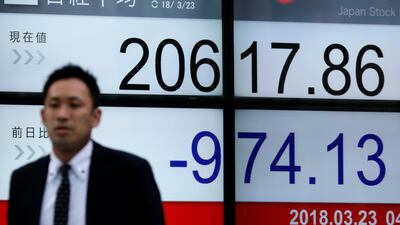Asian markets look set to come under pressure as a sell-off in once much-favoured US technology shares deepened and volatility soared.
Equity benchmarks fell in Tokyo and Seoul, and retreated in Hong Kong where traders returned to their desks after a four-day weekend. Losses were cushioned as US equity futures climbed. Australia’s Santos surged after the energy producer received a takeover offer, helping the benchmark erase a decline on the first trading day after the Easter break. The South Korean won fell from a three-year high as officials warned against excessive movements. The Australian dollar had the biggest gain among G10 currencies against the greenback.
The S&P 500 Index closed below its average price for the past 200 days for the first time since June 2016, with fresh presidential criticism of Amazon.com and retaliatory tariffs from China rattling investors. The Cboe Volatility Index jumped 18 per cent.
_______________
Read more:
Saudi Arabia to list more than 200bn riyals in government bonds and sukuk on Tadawul
Kuwait stock exchange starts second phase of revamp
_______________
After the worst three months for global stocks in more than two years, the second quarter started on the back foot as trade-tension worries festered and technology shares got slammed. The risk-off tone comes two weeks before earnings season begins, with investors still anticipating a strong showing, though watchful for signs of any slowdown in the synchronized global expansion and strains from Federal Reserve tightening.
“What we are really seeing across the economies and markets are opposing forces playing out: in the economy you are seeing Fed versus inflation, in markets you are seeing momentum versus fundamental supports,” said JP Morgan Asset Management Global Market Strategist Hannah Anderson. “Investors need to be aware of these opposing forces along with a lot of the headline risk we are seeing come through when it comes to trade and regulation and how that’s going to impact their portfolios.”
Fanning the rout in tech, the biggest gainers of the bull run, US President Donald Trump renewed his attack on Amazon, sending shares of the online retailer down the most in more than two years. Intel Corp. also had its worst day in two years, after Apple was said to be planning to use its own chips in Mac computers from 2020.
Elsewhere, the Reserve Bank of Australia left interest rates unchanged at its monthly meeting. Crude steadied after its biggest loss in almost two months as fears of a trade war prompted investors to dump commodities and gold held onto gains.

